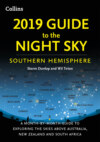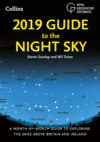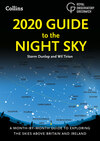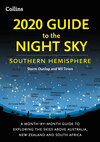Kitabı oku: «2019 Guide to the Night Sky Southern Hemisphere: A month-by-month guide to exploring the skies above Australia, New Zealand and South Africa»

Copyright
Published by Collins
An imprint of HarperCollins Publishers
Westerhill Road
Bishopbriggs
Glasgow G64 2QT
In association with
Royal Museums Greenwich, the group name for the National Maritime Museum,
Royal Observatory Greenwich, Queen’s House and Cutty Sark
© HarperCollins Publishers 2018
Text and illustrations © Storm Dunlop and Wil Tirion
Photographs © see acknowledgements here
Collins ® is a registered trademark of HarperCollins Publishers Ltd
All rights reserved under International and Pan-American Copyright Conventions. By payment of the required fees, you have been granted the non-exclusive, non-transferable right to access and read the text of this e-book on screen. No part of this text may be reproduced, transmitted, downloaded, decompiled, reverse engineered, or stored in or introduced into any information storage and retrieval system, in any form or by any means, whether electronic or mechanical, now known or hereafter invented, without the express written permission of HarperCollins.
The contents of this publication are believed correct at the time of printing. Nevertheless the publisher can accept no responsibility for errors or omissions, changes in the detail given or for any expense or loss thereby caused.
HarperCollins does not warrant that any website mentioned in this title will be provided uninterrupted, that any website will be error free, that defects will be corrected, or that the website or the server that makes it available are free of viruses or bugs. For full terms and conditions please refer to the site terms provided on the website.
A catalogue record for this book is available from the British Library
eBook Edition © Sep 2018
ISBN 9780008311650
Version: [2018-07-24]
Contents
Cover
Title Page
Copyright
Introduction
The Constellations
The Southern Circumpolar Constellations
Comets and the Moon
Map of the Moon
Introduction to the Month-by-Month Guide
Month-by-Month Guide
January
February
March
April
May
June
July
August
September
October
November
December
Glossary and Tables
Acknowledgements
Further Information
About the Publisher
Time Zones
The times of events in this book are given in Coordinated Universal Time (UTC), here abbreviated to Universal Time (UT). This time is equivalent to the time on the Greenwich meridian (GMT), and is used by astronomers around the world so that observations may be compared easily, without having to convert from local (zone) times. Universal Time is always given on a 24-hour clock (sometimes known as ‘military time’ or ‘Zulu’, ‘Z’). In many countries times are generally given as a.m. or p.m. and such times are shown on the charts showing the appearance of the sky for each month. Giving the times of individual events as a.m. or p.m. would be complex and confusing, so those times may need to be converted from UT.
Australia
Australian time zones are shown on this map. There are three: Australian Western Standard Time (AWST); Australian Central Standard Time (ACST); and Australian Eastern Standard Time (AEST). Some individual states (Western Australia, Northern Territory and Queensland) do not use daylight saving time (DST) during the summer months. To obtain local (zone) time from Universal Time (UT), add the hours shown in this table. If the result is greater than 24, subtract 24 hours. If the initial or subsequent result is less than 12:00, the zone time is a.m.; if greater, subtract 12 hours to get the time p.m. The dates when Daylight Saving Time begins and ends are shown on the individual calendars inside the book. At the time of writing, it is introduced on the first Sunday of October and ends on the first Sunday in April.

| Time zone | Winter | Summer | Time zone | Winter | Summer |
| Australia | Add hours shown to UT | Australian Capital Territory | 10:00 (AEST) | 11:00 (DST) | |
| Western Australia | 08:00 (AWST) | no DST | Victoria | 10:00 (AEST) | 11:00 (DST) |
| Northern Territory | 09:30 (ACST) | no DST | Tasmania | 10:00 (AEST) | 11:00 (DST) |
| Queensland | 10:00 (AEST) | no DST | |||
| South Australia | 09:30 (ACST) | 10:30 (DST) | New Zealand | 12:00 (NZST) | 13:00 (NZDT) |
| New South Wales | 10:00 (AEST) | 11:00 (DST) | South Africa | 02:00 (SAST) | no DST |
New Zealand
New Zealand uses a single time zone for the North and South Islands: New Zealand Standard Time (NZST) which is 12 hours ahead of UT. Daylight saving time (NZDT) is used in the summer, and begins on the last Sunday in September and ends on the first Sunday of April. (Note that it begins one week before the Australian start of Daylight Saving Time.) As for Australia, the hours shown above should be added to Universal Time (UT). If the result is greater than 24, subtract 24 hours. If the initial or subsequent result is less than 12:00, the zone time is a.m.; if greater, subtract 12 hours to get the time p.m. The dates when Daylight Saving Time begins and ends are shown on the individual calendars inside the book.
South Africa
South Africa uses a single time zone: South Africa Standard Time (SAST). This is two hours in advance of UT. Daylight Saving Time / Summer Time is not used. To obtain local (zone) time, add two hours to UT. If the result is greater than 24, subtract 24 hours. If the initial or subsequent result is less than 12:00, the zone time is a.m.; if greater, subtract 12 hours to get the time p.m.
Ücretsiz ön izlemeyi tamamladınız.






